Kuwait City – Kuwait’s Crown Prince, Shaikh Mishal Al-Ahmad Al-Jaber Al-Sabah, issued a decree on Monday to dissolve the National Assembly. The decision, he said, was made in accordance with the Constitution and as a reflection of the will of the Kuwaiti people.
The Prime Minister presented the proposal for dissolution to the cabinet, which approved it.
The Crown Prince has now affirmed the decision and called on all relevant parties, including the Prime Minister and ministers, to implement the decree immediately, effective from the time of its issuance.
The ruling Al-Sabah family and the Assembly have been engaged in regular feuding, with opposition members accusing ministers from the royal family of mismanagement and corruption.
The dissolution is aimed at defusing political tensions and calling for early elections.
Despite being the only Gulf Arab state to have an elected government, the emirate – one of the world’s largest producers of crude oil – remains mired in political turmoil.
On April 9, its seventh new government in three years was announced after the previous government resigned in January, just three months after taking office.
Kuwait adopted a parliamentary system in 1962, but repeated political crises have caused state paralysis.
The country suffers from constant stand-offs between elected lawmakers and cabinets installed by the reigning Al-Sabah family, which keeps a firm grip on political life.
In March, the constitutional court nullified the results of legislative elections held last year — in which the opposition won the most seats — and ruled to reinstate the previous parliament instead.
Unlike other Gulf Arab states, Kuwait has a vigorous political life in which MPs and civil society regularly take the authorities to task.
However, the Al-Sabahs keep a firm grip on ministerial portfolios, reserving key cabinet posts for members of the family.
The emir, 85-year-old Nawaf al-Ahmad Al-Sabah, has stepped back from political life in favour of the crown prince, 82.
The lack of stability in Kuwait has scared off investors and dashed hopes of reform in a wealthy country struggling to diversify in similar ways to Gulf powerhouse Saudi Arabia, the United Arab Emirates and Qatar.

